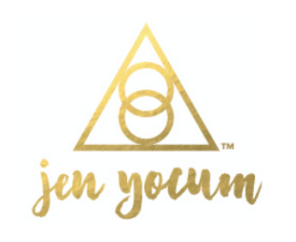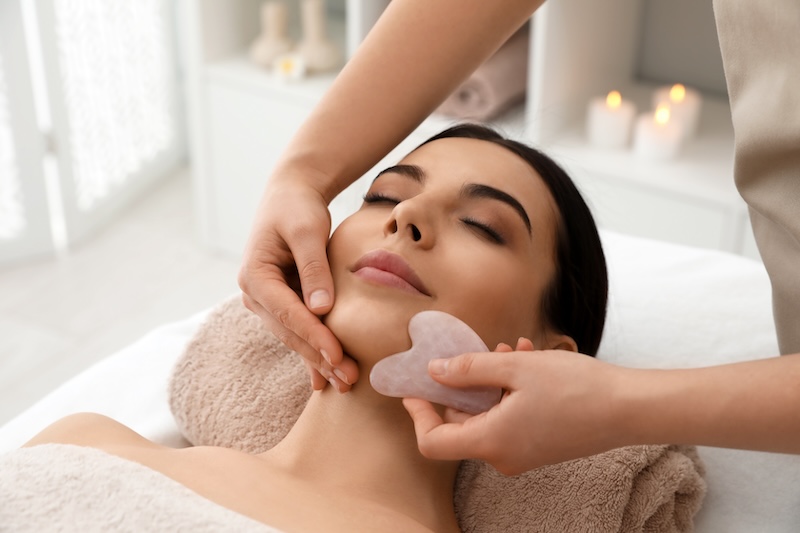By Dr. Jennifer L. Yocum, Licensed Acupuncturist
If you’re like me and many adults, you may suffer from teeth clenching, grinding (also known as bruxism), or temporomandibular joint (TMJ) disorders. Stress, anxiety, sleep apnea and even gut imbalances or parasites can cause up to one-third of all adults to clench or grind their teeth during the day, or one in ten at night (and some of us do both). It is estimated that 5-12% of all adults are diagnosed with some type of TMJ disorder, which as the name implies, involves the joint itself, and can cause pain, clicking, and other types of joint dysfunction (Cleveland Clinic, 2023). While bruxism can cause TMJ, you can have one without the other, and you can also simply clench your teeth without grinding or TMJ. Genetics may also cause someone to be more prone to developing a TMJ disorder.
Symptoms of clenching, grinding, or TMJ include pain in the in the face, jaw muscle, or joint, noticing that you’re clenching, sore jaw or teeth, aching pain in or around the ear, difficulty chewing or having pain while chewing, or locking or clicking of the jaw (Mayo Clinic, 2018). While the most common current treatment for mild to moderate symptoms is use of a personalized mouth guard or Botox injections into the masseter muscle, there are other natural treatments that can be added in to produce relief with no side effects.
- Acupuncture. Acupuncture needles can help to relax tight muscles, relieve pain, and reduce stress. Needles may be inserted into the face around the masseter muscles, and/or in points shown to relax muscles, nourish the joints, and lower anxiety to give you immediate relief. Over time, regular acupuncture can help calm the nervous system and help you better manage stress, gut health, and other causes of clenching, bruxism, or TMJ disorders.
- Facial Gua Sha. Facial gua sha is a Chinese Medicine-based technique that involves application of an oil or lubricant to the skin, and then gently “raking” a flat contoured stone over areas of the face to encourage relaxation of the muscles, improved circulation, and proper lymphatic drainage. In treatment of jaw tightness or pain, an acupuncturist can perform a specific protocol designed to relax the masseter muscles of the face and improve energy flow.
- Face Yoga/Facial Exercises. Doing regular stretches for the face can help to relax the muscles and release tension in the masseter muscles. There are many free online videos demonstrating different poses that you can try to see which ones are most effective for your symptoms.
- Massage. Whether performing self-massage or visiting a massage therapist who specializes in jaw pain or muscle tightness, massage can be incredibly helpful in relaxing tight masseter muscles. Similar to the facial exercises, there are many free online tutorials that you can start with; for more intense muscle tightness or pain, visit a professional.
- Mindfulness. If you are someone who clenches, a mindfulness exercise that I’ll call “intentional jaw relaxation time” can be very useful. As someone who clenches both day and night, I’ve found over time that it’s important to take time during the day and before bed to check in with myself, especially if I feel my masseter muscles start to ache. A couple times during the day, I take note as to whether I’m clenching or stiffly holding my jaw, rather than allowing it to relax. Where am I holding my tongue? How do my muscles feel? Can I allow myself to just let the jaw go? If needed, I open and close my mouth widely a couple times, as if I’m yawning, to allow the muscles to relax. I allow my tongue to relax, the tip only lightly resting on the roof of the mouth. I take a few deep breaths and notice how my jaw muscles feel. If they feel tense, I may give them a gentle massage, and then take a few more breaths.
At night, I similarly check in with myself in this type of meditation, but do so lying on my back. This different position causes me to notice different tension and sensations in my jaw, and when I’m tensing versus allow the jaw to relax. If I roll onto my side, I notice if there is any jaw tension or if I’m clenching. If I decide to meditate, am I able to continue to allow the jaw to be loose, or do I notice any tightness? When I put in my mouth guard at night, do I notice any shifts to how I hold my jaw or how much I clench? What does it feel like in the morning? How does it feel if I don’t wear my mouth guard to sleep? Do my teeth and jaw ache more or less?
Taking time for this mindfulness practice helps me to catch myself more frequently when I’m clenching, and to notice what practices benefit me. For example, if I don’t wear my mouth guard to sleep, my teeth and jaw are sore in the morning and I feel the muscle tension continue over the course of the day. Practicing that mindfulness and having that awareness then allows me to have an embodied remembrance of the pain, and I can choose to put the mouth guard in the next evening, or know I may have more pain if I don’t.
Trying one or more of these treatments or practices will give at least temporary relief from tight jaw muscles and aching joints, and with regular use, provide longer lasting results. It’s important to talk to your doctor if you continue to experience pain, grinding, and/or clenching. Your healthcare provider can help determine the root cause of your TMJ and outline the best treatment plan to minimize or alleviate your symptoms.
References
Cleveland Clinic. (2023, May 15). Temporomandibular joint (TMJ) disorders. https://my.clevelandclinic.org/health/diseases/15066-temporomandibular-disorders-tmd-overview
Mayo Clinic. (2018, December 28). TMJ disorders. https://www.mayoclinic.org/diseases-conditions/tmj/symptoms-causes/syc-20350941
Note: This article was originally published in a local magazine for their October 2024 issue. For citation references, please contact Dr. Yocum at https://jenyocum.com/contact/


Recent Comments